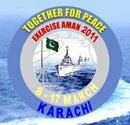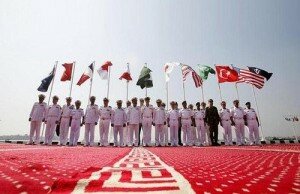Pakistan Navy: Lessons from Aman-11
Posted on 17. Mar, 2011 by S M Hali in Pakistan Navy
By S. M. Hali
 The Arabian Sea has become the nucleus of international maritime operations, since the bulk of petroleum products from the Middle East, and trade goods of myriad nationalities ply these waters. Pakistan’s strategic location makes it imperative to contribute towards maritime cooperation since the region became engulfed with the threat of terrorism and piracy. Cognizant of the fact that no single navy can ensure the uninterrupted supply of petroleum to meet the global energy needs, Pakistan Navy (PN) developed the concept of Aman (peace) series of exercises. Aman encompasses professional and social activities in harbour and at sea designed to promote coordination, interoperability and harmony amongst international navies. The concept incorporates the complete gamut of maneuvers to test full operational limits while undertaking strategies and tactics designed to counter the major threats to maritime security.
The Arabian Sea has become the nucleus of international maritime operations, since the bulk of petroleum products from the Middle East, and trade goods of myriad nationalities ply these waters. Pakistan’s strategic location makes it imperative to contribute towards maritime cooperation since the region became engulfed with the threat of terrorism and piracy. Cognizant of the fact that no single navy can ensure the uninterrupted supply of petroleum to meet the global energy needs, Pakistan Navy (PN) developed the concept of Aman (peace) series of exercises. Aman encompasses professional and social activities in harbour and at sea designed to promote coordination, interoperability and harmony amongst international navies. The concept incorporates the complete gamut of maneuvers to test full operational limits while undertaking strategies and tactics designed to counter the major threats to maritime security.
The first of the series was conducted in 2007, followed by 2009 and now Aman-11, which was executed 8 to 12 March 2011; subsequently building on lessons learnt from each. Defence planners will evolve lessons in time but the general lessons that emerge from Aman-11 are presented here. This year’s exercise was designed to develop and improve tactics and techniques against maritime terrorism thus it was based on offensive and defensive operations to protect economic activities at sea. The major threats to maritime security comprise the use of force against the sovereignty, territorial integrity or political independence of a state; terrorist acts against shipping, offshore installations and other maritime interests, illegal transport of weapons of mass destruction, unlawful acts; piracy and armed robbery at sea; transactional organized crime like human trafficking, smuggling of narcotics, drugs and arms; threats to resource security such as illegal, unregulated and unreported fishing; environmental threats e.g. major pollution incidents, illegal dumping.
The planners of Aman-11 must be credited for focusing on objectives like the display of united resolve against terrorism and crimes in maritime domain; contributing towards regional peace and stability and enhancing interoperability between regional navies  thereby acting as a bridge between the regions. The concept of the exercise revolved around the provision of a common forum for information sharing, mutual understanding and identifying areas of common interest; the development and execution of response tactics, techniques and procedures against asymmetric and traditional threats during sea phase of the exercise. The twelve navies that participated with naval assets of ships, aircraft and marines and the thirty-one navies, who contributed observers, gelled into one cohesive force to achieve maritime security management by transcending national boundaries and regional jurisdiction.
thereby acting as a bridge between the regions. The concept of the exercise revolved around the provision of a common forum for information sharing, mutual understanding and identifying areas of common interest; the development and execution of response tactics, techniques and procedures against asymmetric and traditional threats during sea phase of the exercise. The twelve navies that participated with naval assets of ships, aircraft and marines and the thirty-one navies, who contributed observers, gelled into one cohesive force to achieve maritime security management by transcending national boundaries and regional jurisdiction.
It is heartening to note that Aman-11 blended theory and practice to achieve its ends of combating contemporary challenges in maritime security. Multifarious activities at sea involved boarding drills, cross deck landing serial, helicopter landings, Anti-Surface Warfare serials, including Naval gun firings on target at sea, Night Encounter Exercise and Maritime Interdiction Operation, Coordinated Missile attacks Exercise from Missile Boats and fighter aircraft, Anti Submarine Warfare exercise involving ships, Helos and Aircraft, an international Fleet Review including replenishment between ships while at sea, Anti-Piracy exercise, Naval gun firings on target at sea and Fly-Past by air craft from various participating nations.
For the theoretical brain storming session, the National Centre for Maritime
Policy Research organized and hosted an International Maritime Conference in which a diverse group of scholars presented papers on the theme of “Maritime security management—contemporary challenges and need for global cooperation”. The international conference was aimed at identifying the untapped economic, political and social areas of cooperation among the littoral states promoting the need of creating maritime awareness in the region. The planners of the exercise must take solace in the fact that they managed to promote and create understanding towards reassessing their working direction, decision making and enhancing their overall maritime vision. It will not be out of place to mention that Aman-11 identified new opportunities emerging from the ocean for problem solving, conflict resolution and took cognizance of the emerging dangers and challenges being faced and their effects on littoral states’ mindset and vision.
The participating navies and observers of this multination exercise will benefit immensely from the evolved measures and steps towards a collective approach to dealing with maritime threat. PN deserves kudos for its endeavour because in the current times, when Pakistan had become nearly isolated, having the lost the opportunity to host the Cricket World Cup, other sports, business and trade teams avoiding Pakistan due to terror threats; for PN to host 40 Navies, share cultural, sports and operational activities with no hitch is a major achievement.
loading...


